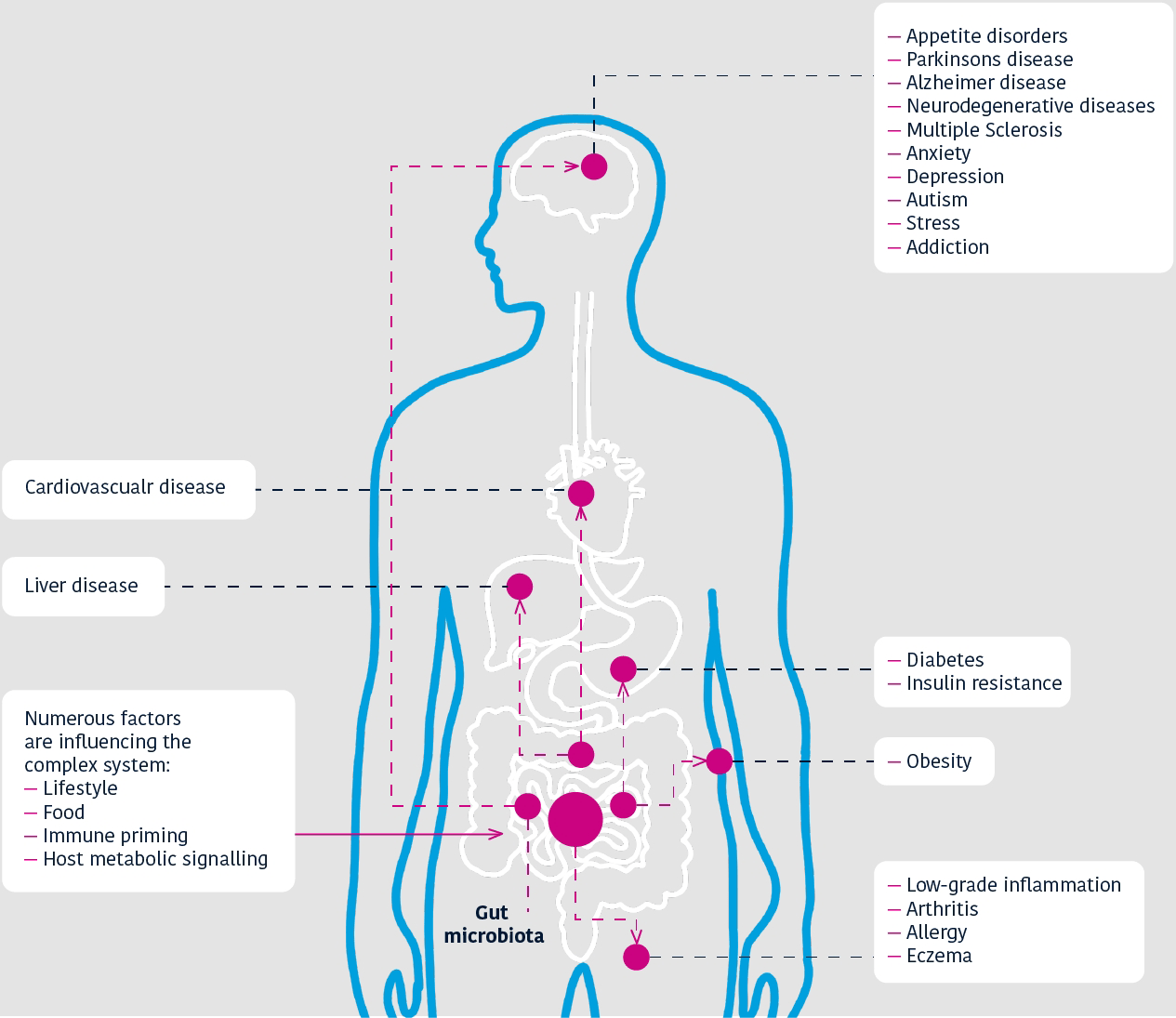What is the gut microbiome?
Before we can answer this question accurately, there is a distinction to be made between two terms: microbiota and microbiome.
The human microbiota is made up of the 10-100 trillion microbial cells that are within each person – primarily existing within the gut; the human microbiome consists of the genes that make up these cells. 1
The gut microbiome is vital to supporting fundamental nutritional, metabolic and immune system mechanisms – which is why it’s so important to ensure that it’s kept healthy, protected and balanced, in order that it can carry out these roles as effectively as possible. 2
What makes up the gut microbiome?

Gut microbiota — at the intersection of everything? Patrice D. Cani, Nature Reviews Gastroenterology & Hepatology, 2017
BACTERIA
YEASTS
VIRUSES
ARCHAEA
FUNGI
The gastrointestinal tract plays host to more than one thousand species of bacteria, which are actually beneficial. A gut that contains a diverse array of bacteria has been shown to be more stable and resilient to, for example, infection – so diversity of bacteria is known to be an indicator of a healthy gut. 4
However, research has demonstrated that the composition of the gut microbiome is not static, and can alter according to changes in diet 5, stress 6 or amount and quality of sleep. 7
Balancing the gut microbiome
The gut microbiome varies from person to person – each one not identical to any other. The precise quantities of different microbes is dependent on a number of circumstances, not all of which we are able to influence.
When a child is born, for example, the way they are delivered can have an impact on the transition of microbiota between mother and baby. If an unborn baby is exposed to antibiotics in the womb, then this too can have an impact on the make-up of their gut microbiome. 8
However, individuals do have control over the lifestyle choices they make, and this can have a significant impact in terms of maintaining the balance of their gut microbiome. By striving towards healthy practices – such as eating a nutritious, varied diet, or exercising frequently – individuals can thereby maximise the likelihood of achieving a healthy balance in their gut microbiome.9
What does the gut microbiome do in the body?
The gut microbiome plays a key role in a number of functions that help to sustain a healthy body:
METABOLISM
IMMUNITY
PROTECTION
The gut microbiota acts as a structural barrier, preventing pathogen adhesion and subsequent colonisation. 13
REFERENCES
1 Ursell LK, et al. Defining the human microbiome. Nutr Rev 2012;70(1):S38-S44.
2 Bull MJ and Plummer NT. The human gut microbiome in health and disease. Integr Med 2014;13(6):17-22.
3 Sender R, et al. Revised estimates for the number of human and bacteria cells in the body. PLOS Biology 2016;14(8):e1002533.
4 McBurney MI, et al. Establishing what constitutes a healthy human gut microbiome: state of the science, regulatory considerations, and future directions. J Nutrition 2019;149(11):1882-1895.
5 So D, et al. Dietary fiber intervention on gut microbiota composition in healthy adults: a systematic review and meta-analysis. Am J Clin Nutrition 2018;107(6):965-983.
6 Conlon MA and Bird AR. The impact of diet and lifestyle on gut microbiota and human health. Nutrients 2015;7(1):17-44.
7 Benedict C, et al. Gut microbiota and glucometabolic alterations in response to recurrent partial sleep deprivation in normal-weight young individuals. Mol Metab 2016;5(12):1175-1186.
8 Mueller NT, et al. The infant microbiome development: mom matters. Trends Mol Med 2015;21(2):109-117.
9 Quigley E. Gut microbiome as a clinical tool in gastrointestinal disease management: are we there yet? Nat Rev Gastroenterol Hepatol 2017;14:315-320.
10 Gill PA, et al. Review article: short chain fatty acids as potential therapeutic agents in human gastrointestinal and inflammatory disorders. Aliment Pharmacol Ther 2018;48(1):15-34.
11 Magnusdottir S, et al. Systematic genome assessment of B-vitamin biosynthesis suggests co-operation among gut microbes. Front Genet 2015;6:148.
12 Cryan JF, et al. The microbiota-gut-brain axis. Physiol Rev 2019;99(4):1877-2013.
13 Iacob S, et al. Intestinal Microbiota as a Host Defense Mechanism to Infectious Threats. Front Microbiol 2018;9:3328.